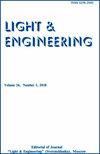隧道门限区太阳能光纤与电光源采光的比较研究
IF 0.3
4区 工程技术
Q4 ENGINEERING, ELECTRICAL & ELECTRONIC
引用次数: 2
摘要
近年来,由于隧道区域,特别是入口和出口区域周围的照明系统不合理,隧道区域的交通事故有了相当大的增加;导致人类财产和生命的损失。因此,照明设计师努力改善门槛区和出口区的照明问题,这两个区域分别产生“黑洞”和“白洞”效果。提出了几种解决方案:太阳能光纤照明系统作为自然照明系统,LED、荧光照明系统作为人工照明系统。本文旨在对自然照明和人工照明系统进行比较,以说明哪种照明系统更好,以及解决这些问题的最佳方案。之前在中国的花树岩隧道中,使用自然光和太阳能光纤照明阈值区域,在LITSTAR4D软件中使用LITPA公司定制的HCL-TN LED灯具Сompany进行模拟。仿真结果与采用太阳能光纤时的仿真结果进行了比较。仿真结果令人满意,平均亮度为91.15 cd/m2,高于阈值区要求的平均亮度。然而,与太阳能光纤系统产生的181.31 cd/m2的平均亮度相比,它就少了。0.42的整体均匀度高于CIE88:2004标准的要求。本文章由计算机程序翻译,如有差异,请以英文原文为准。
Comparative Study of Solar Optical Fibre and Electrical Light for Daylighting in Tunnel Threshold Zone
In recent years, there has been a considerable increase in traffic accidents in the tunnel region, especially around the threshold and exit zones, due to the inappropriate lighting system of these zones; leading to the loss of humans properties and lives. Therefore, lighting designers strive to improve the illumination issues of the threshold and exit zones which bring about “black hole” and “white hole” effects, respectively. Several solutions are proposed: solar optical fibre lighting system as a natural lighting system and LED, fluorescent lighting system as the artificial lighting system. This paper aims to compare the natural and artificial lighting system to show which lighting system is better and the best solution to solve these issues. The previous study in the Huashuyan tunnel in China, where natural light, solar optical fibre was used to illuminate the threshold zone, is simulated in LITSTAR4D software using a customized HCL-TN LED luminaire of LITPA Сompany. The simulation result is compared with the previous result obtained when the solar optical fibre is used. The simulation outcome gave a satisfying result with an average luminance of 91.15 cd/m2, which is higher than the average luminance required by the threshold zone. However, it is less when compared to the average luminance of 181.31 cd/m2 produced by the solar optical fibre system. The overall uniformity of 0.42 is above the requirements in the CIE88:2004 standards.
求助全文
通过发布文献求助,成功后即可免费获取论文全文。
去求助
来源期刊

Light & Engineering
ENGINEERING, ELECTRICAL & ELECTRONIC-OPTICS
CiteScore
1.00
自引率
50.00%
发文量
0
审稿时长
1 months
期刊介绍:
Our magazine
develops comprehensive communication within the lighting community, providing opportunities for discussion and free expression of opinions of specialists of different profiles;
contributes to the convergence of science and engineering practice, the search for opportunities for the application of research results in lighting and technological applications of light;
keeps the scientific community up to date with the latest advances in the theory of the light field, providing readers with operational professional information;
initiates international cooperation, promotes and distributes the results of Russian authors in the international professional community;
provides equal opportunities for authors from different regions of Russia and other countries.
The journal publishes articles in the following areas:
visual and non-visual effects of radiation on humans;
light field theory;
photometry and colorimetry;
sources of light;
ballasts;
light devices, their design and production technology;
lighting and irradiation installation;
light signaling;
methods of mathematical modeling of light devices and installations;
problems of energy saving in lighting, installation and operation of lighting installations;
modern production technologies of lighting products for lighting control systems;
innovative design solutions;
innovations in lighting and lighting design;
the study of the effect on plants and animals, problems of using light in medicine;
problems of disinfection of premises, water and smell elimination with the help of technology of UV radiation using;
problems of light in the ocean and space.
 求助内容:
求助内容: 应助结果提醒方式:
应助结果提醒方式:


